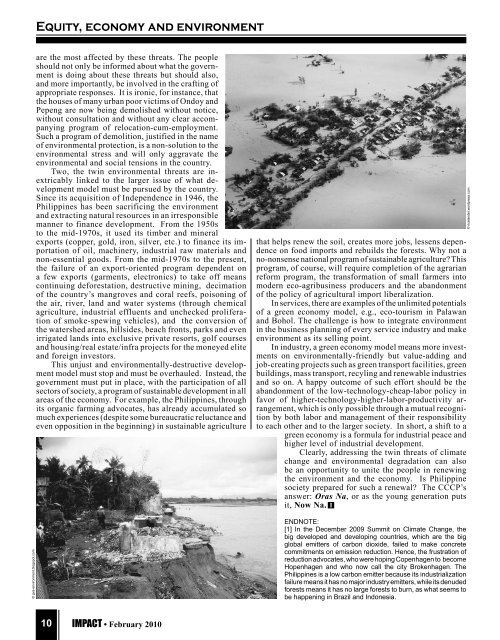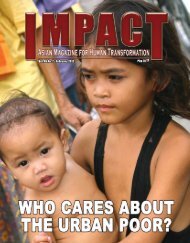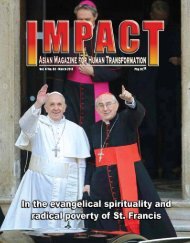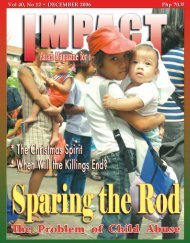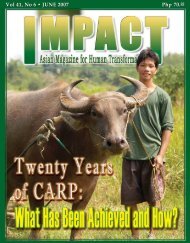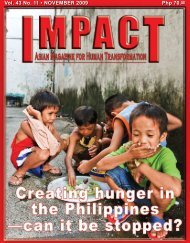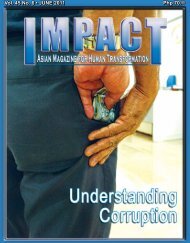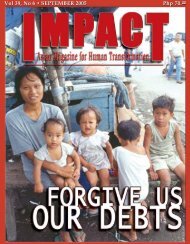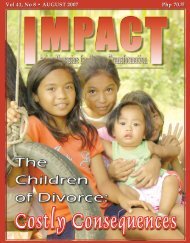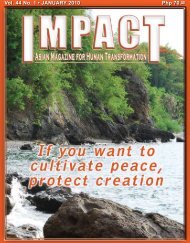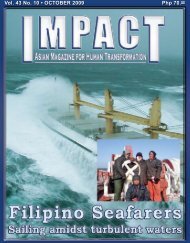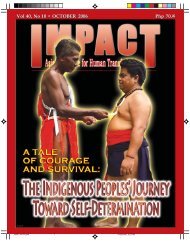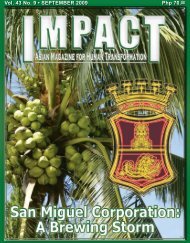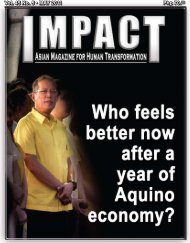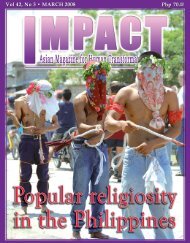Download - IMPACT Magazine Online!
Download - IMPACT Magazine Online!
Download - IMPACT Magazine Online!
You also want an ePaper? Increase the reach of your titles
YUMPU automatically turns print PDFs into web optimized ePapers that Google loves.
Equity, economy and environment<br />
© gva-environment.blogspot.com<br />
are the most affected by these threats. The people<br />
should not only be informed about what the government<br />
is doing about these threats but should also,<br />
and more importantly, be involved in the crafting of<br />
appropriate responses. It is ironic, for instance, that<br />
the houses of many urban poor victims of Ondoy and<br />
Pepeng are now being demolished without notice,<br />
without consultation and without any clear accompanying<br />
program of relocation-cum-employment.<br />
Such a program of demolition, justified in the name<br />
of environmental protection, is a non-solution to the<br />
environmental stress and will only aggravate the<br />
environmental and social tensions in the country.<br />
Two, the twin environmental threats are inextricably<br />
linked to the larger issue of what development<br />
model must be pursued by the country.<br />
Since its acquisition of Independence in 1946, the<br />
Philippines has been sacrificing the environment<br />
and extracting natural resources in an irresponsible<br />
manner to finance development. From the 1950s<br />
to the mid-1970s, it used its timber and mineral<br />
exports (copper, gold, iron, silver, etc.) to finance its importation<br />
of oil, machinery, industrial raw materials and<br />
non-essential goods. From the mid-1970s to the present,<br />
the failure of an export-oriented program dependent on<br />
a few exports (garments, electronics) to take off means<br />
continuing deforestation, destructive mining, decimation<br />
of the country’s mangroves and coral reefs, poisoning of<br />
the air, river, land and water systems (through chemical<br />
agriculture, industrial effluents and unchecked proliferation<br />
of smoke-spewing vehicles), and the conversion of<br />
the watershed areas, hillsides, beach fronts, parks and even<br />
irrigated lands into exclusive private resorts, golf courses<br />
and housing/real estate/infra projects for the moneyed elite<br />
and foreign investors.<br />
This unjust and environmentally-destructive development<br />
model must stop and must be overhauled. Instead, the<br />
government must put in place, with the participation of all<br />
sectors of society, a program of sustainable development in all<br />
areas of the economy. For example, the Philippines, through<br />
its organic farming advocates, has already accumulated so<br />
much experiences (despite some bureaucratic reluctance and<br />
even opposition in the beginning) in sustainable agriculture<br />
that helps renew the soil, creates more jobs, lessens dependence<br />
on food imports and rebuilds the forests. Why not a<br />
no-nonsense national program of sustainable agriculture? This<br />
program, of course, will require completion of the agrarian<br />
reform program, the transformation of small farmers into<br />
modern eco-agribusiness producers and the abandonment<br />
of the policy of agricultural import liberalization.<br />
In services, there are examples of the unlimited potentials<br />
of a green economy model, e.g., eco-tourism in Palawan<br />
and Bohol. The challenge is how to integrate environment<br />
in the business planning of every service industry and make<br />
environment as its selling point.<br />
In industry, a green economy model means more investments<br />
on environmentally-friendly but value-adding and<br />
job-creating projects such as green transport facilities, green<br />
buildings, mass transport, recyling and renewable industries<br />
and so on. A happy outcome of such effort should be the<br />
abandonment of the low-technology-cheap-labor policy in<br />
favor of higher-technology-higher-labor-productivity arrangement,<br />
which is only possible through a mutual recognition<br />
by both labor and management of their responsibility<br />
to each other and to the larger society. In short, a shift to a<br />
green economy is a formula for industrial peace and<br />
higher level of industrial development.<br />
Clearly, addressing the twin threats of climate<br />
change and environmental degradation can also<br />
be an opportunity to unite the people in renewing<br />
the environment and the economy. Is Philippine<br />
society prepared for such a renewal? The CCCP’s<br />
answer: Oras Na, or as the young generation puts<br />
it, Now Na. I<br />
ENDNOTE:<br />
[1] In the December 2009 Summit on Climate Change, the<br />
big developed and developing countries, which are the big<br />
global emitters of carbon dioxide, failed to make concrete<br />
commitments on emission reduction. Hence, the frustration of<br />
reduction advocates, who were hoping Copenhagen to become<br />
Hopenhagen and who now call the city Brokenhagen. The<br />
Philippines is a low carbon emitter because its industrialization<br />
failure means it has no major industry emitters, while its denuded<br />
forests means it has no large forests to burn, as what seems to<br />
be happening in Brazil and Indonesia.<br />
© ricelander.wordpress.com<br />
10<br />
<strong>IMPACT</strong> • February 2010


